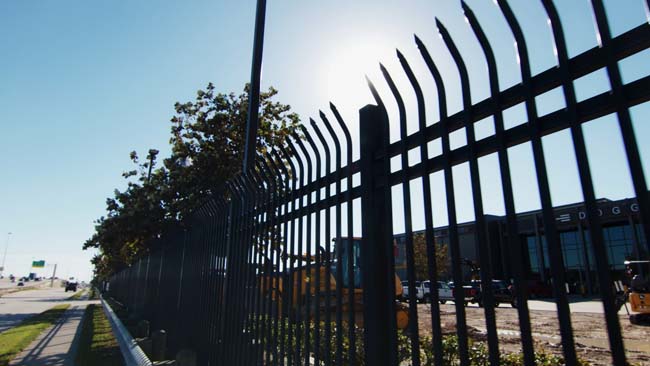Secure Your Home with the Best Security Fence Materials
Having a secure home is every homeowner’s dream, and achieving this starts with installing the right security fence. This not only discourages unwelcome guests but also adds a robust level of privacy your family requires. In today’s increasingly insecure world, knowing the best security fence materials for your property is crucial in safeguarding what matters most to you. Dive into our comprehensive guide that demystifies the entire process, ensuring you can sleep soundly at night knowing your home isn’t just aesthetically pleasing, but it’s also a fortress against potential intruders.

Overview of Best Security Fence Materials & Types
When it comes to securing your home, choosing the right fence materials is essential. By selecting the best security fence materials, you can create a physical barrier that deters potential intruders and ensures the safety of your property. Let’s explore some of the top options available in the market today.
Wood Fences: Wood has long been a popular choice for residential fencing due to its versatility and aesthetic appeal. While they may not offer the same level of security as other materials, wood fences can still provide a sense of privacy. To enhance security, consider using taller pickets, adding lattice tops, or installing sharp-pointed metal finials.
For instance, cedar wood fences are known for their durability and resistance to rot and insects. They can also be designed with overlapping boards or tongue-and-groove panels to minimize visibility and increase security.
Wrought Iron Fences: If you’re looking for an elegant yet secure option, wrought iron fences are an excellent choice. These fences are made from sturdy iron bars or panels that provide both strength and visibility. With their ornate designs and durable construction, wrought iron fences act as a deterrent while still enhancing the overall aesthetics of your property.
However, it’s important to note that wrought iron requires regular maintenance to prevent rusting. Applying protective coatings and inspecting for any signs of damage or wear is crucial in ensuring its longevity and effectiveness as a security measure.
Aluminum Fences: Aluminum fences combine strength with low maintenance requirements. They are lightweight yet surprisingly durable, making them ideal for enhancing the security of your home without sacrificing aesthetics. Additionally, aluminum fences are resistant to corrosion, making them suitable for areas with high humidity or coastal environments.
While some may argue that aluminum lacks the same level of strength as steel or wrought iron, advancements in manufacturing techniques have improved the durability of aluminum fences. With reinforced posts and advanced welding methods, modern aluminum fences can provide reliable security for your property.
Vinyl Fences: Vinyl fences are gaining popularity due to their durability and low maintenance requirements. These fences are resistant to rot, pests, and harsh weather conditions. Vinyl panels can be designed with additional reinforcements or a solid privacy style to enhance the security and privacy of your property.
To make it easier to compare the strengths and weaknesses of different fence materials:
| Fence Material | Strengths | Weaknesses |
| Wood | Aesthetic appeal, versatility | Requires regular maintenance, may not offer maximum security |
| Wrought Iron | Sturdy construction, elegant design | Susceptible to rust, requires maintenance |
| Aluminum | Lightweight, low maintenance | May lack the same level of strength as steel |
| Vinyl | Durability, resistance to rot and pests | Limited color options, may fade over time |
Now that we have explored an overview of the best security fence materials and their unique qualities, let’s dive deeper into understanding the specific strengths and security features offered by each material.
Strength and Security of Different Materials
Different fencing materials offer varying levels of strength and security. Understanding these qualities can help you make an informed decision when selecting the best option for your home.
Wood fences, while not as inherently secure as other materials due to their visibility through the gaps between pickets, can be enhanced for increased security. By choosing taller pickets or adding additional elements such as lattice tops or metal finials, you can deter potential intruders while maintaining a classic aesthetic appeal.
On the other hand, wrought iron fences are known for their superior strength. The solid iron bars or panels make it difficult for intruders to breach the barrier. Additionally, the visibility provided by wrought iron fences acts as a deterrence, as potential intruders are more likely to be noticed by neighbors or passersby.
Aluminum fences strike a balance between strength and low maintenance requirements. While they may not possess the same level of robustness as steel or wrought iron, advancements in manufacturing have made them more resistant to damage. Reinforced posts and advanced welding techniques ensure that aluminum fences provide a secure barrier for your property.
Vinyl fences offer excellent durability and resistance to rot, pests, and harsh weather conditions. These attributes contribute to their overall security. Additionally, vinyl panels can be reinforced or designed with solid privacy styles to minimize visibility and enhance security.
By understanding the unique strengths and security features of each fencing material, you can make an informed decision based on your specific needs and preferences.
Steel Fences: Ensuring Maximum Security
When it comes to home security, steel fences are often regarded as the go-to option for ensuring maximum protection. These formidable structures are built to withstand various threats and provide an effective deterrent against potential intruders. By utilizing high-quality steel materials and expert craftsmanship, homeowners can enjoy peace of mind knowing that their property is well-guarded.
Imagine a scenario where you live in a neighborhood prone to break-ins. Installing a steel fence around your property provides a strong physical barrier that acts as the first line of defense against unwanted visitors. Its durability and resilience make it challenging for intruders to breach, significantly reducing the risk of unauthorized access.
One of the key advantages of steel fences is their strength and durability. Made from robust materials such as galvanized steel, these fences can withstand harsh weather conditions, attempted forced entry, and even damage caused by accidents or vandalism. This longevity ensures that your investment in a security fence will provide long-term protection for your home and family.
Moreover, steel fences offer versatility in terms of design options. Whether you prefer a classic wrought iron look or a more contemporary style, steel can be crafted into various intricate patterns and designs to suit your aesthetic preferences. This allows homeowners to enhance both the security and visual appeal of their properties simultaneously.
Now that we’ve explored the benefits of steel fences for home security, let’s delve into the pros and cons of this popular choice.
Pros and Cons of Steel Fences for Home Security
Steel fences come with several advantages when it comes to home security. Let’s start with the pros:
- Strength and Deterrence: Steel fences are known for their sheer strength and ability to deter potential intruders. The solid and impenetrable nature of these fences creates a formidable barrier that discourages unauthorized access.
- Durability: Steel is highly durable, capable of withstanding harsh weather conditions, corrosion, and physical impact. This ensures that your fence will remain sturdy and effective in protecting your property for years to come.
- Low Maintenance: Compared to other fencing materials, steel fences require minimal maintenance. They do not rot or warp like wood, nor do they require regular staining or painting. This makes them a convenient and cost-effective option in the long run.
While steel fences offer numerous benefits for home security, it’s important to consider the potential drawbacks as well:
- Expense: Steel fences can be relatively expensive compared to other materials like aluminum or vinyl. The higher cost reflects the strength and durability that steel provides.
- Weight: Steel fences are considerably heavier than other fencing options. As a result, installation may require more effort and specialized equipment.
- Maintenance: While steel fences require less maintenance overall, they may still require occasional touch-ups or repairs if they become damaged.
For instance, if a vehicle accidentally collides with a section of the fence, it might result in dents or bends that would need repair work.
Ultimately, the decision to install a steel fence for home security will depend on your specific needs, budget, and aesthetic preferences. It’s important to thoroughly evaluate both the advantages and disadvantages before making an informed choice that aligns with your priorities.
Aluminum Fences: Balancing Strength & Maintenance
When it comes to choosing the best security fence materials for your home, aluminum fences have gained popularity for striking a balance between strength and low maintenance. Aluminum is known for its durability, making it a reliable option for security purposes. The material is resistant to corrosion and rust, ensuring that your fence will remain intact and functional for years to come. This is especially important when considering the long-term protection of your home.
Picture this: A homeowner installs an aluminum fence around their property, providing a strong deterrent against potential intruders. Years pass, and despite exposure to harsh weather conditions, the fence remains sturdy and free from any significant signs of wear and tear. The homeowner can rest easy knowing their investment has paid off in terms of both security and minimal maintenance.
The lightweight nature of aluminum also makes it easier to install compared to other materials, reducing installation time and costs. Its malleability allows for various styles and designs, offering homeowners the option to customize their fence according to their aesthetic preferences without compromising on security. Whether you prefer a sleek modern design or want to replicate the classic look of wrought iron, aluminum fences can be tailored to suit your unique style.
While aluminum fences offer exceptional strength and minimal maintenance requirements, it’s essential to consider both the pros and cons before deciding.
Pros and Cons of Aluminum Fences for Home Security
Pros:
- Strength: Aluminum fences are highly durable, providing a strong barrier that deters potential intruders.
- Low Maintenance: Unlike wood fences that require regular staining or painting, aluminum fences are virtually maintenance-free. Simply wash them periodically with soap and water to keep them looking fresh.
- Versatility in Design: Aluminum can be molded into different styles and designs, allowing homeowners to choose a fence that complements their home’s architecture.
- Longevity: With its resistance to rust and corrosion, an aluminum fence can last for decades, making it a long-term investment.
Cons:
- Cost: While aluminum fences offer numerous benefits, they tend to be more expensive upfront compared to other materials like wood or vinyl. However, the long-term savings in maintenance costs can offset the initial investment.
- Limited Privacy: Aluminum fences typically have evenly spaced pickets or rails, which provide little privacy. Homeowners seeking enhanced privacy may need to consider additional measures like adding privacy slats or planting shrubs alongside the fence.
- Vulnerability to Impact: While aluminum is durable and resistant to weather conditions, it may dent or bend upon significant impact. Keep this in mind if your property experiences frequent extreme weather or has high traffic areas near the fence.
Now that we’ve explored the pros and cons of aluminum fences for home security, let’s move on to discussing other versatile materials that can provide flexible protection for your home.
PVC and Acrylic Fences: Flexible Protection for Your Home
When it comes to securing your home, PVC and acrylic fences offer a versatile and effective solution. These types of fences are made from durable, synthetic materials that provide both protection and aesthetic appeal.
PVC (polyvinyl chloride) fences are popular due to their low maintenance requirements and resistance to rot, rust, and pests. They are known for their flexibility, making them an excellent choice for homeowners who live in areas prone to high winds or extreme temperatures. Additionally, PVC fences come in a variety of styles, colors, and textures, allowing you to customize the look of your fence to match your home’s architecture.
Acrylic fences, on the other hand, offer enhanced visibility while still providing security. These fences are transparent or semi-transparent, allowing you to maintain a clear line of sight while keeping unwanted intruders out. Acrylic fences are often used around swimming pools or in areas where visibility is important, such as front yards or commercial properties.
Both PVC and acrylic fences boast impressive durability and weather resistance. They can withstand harsh weather conditions without cracking, warping, or fading over time. This makes them ideal choices for long-term investments in home security.
Furthermore, these types of fences require minimal upkeep compared to traditional materials like wood or iron. With PVC and acrylic fences, you won’t have to worry about repainting or applying protective coatings regularly. A simple rinse with water will keep them looking clean and well-maintained.
Pros and Cons of PVC/Acrylic Fences for Home Security
Now that we understand the advantages of PVC and acrylic fences in terms of flexibility and aesthetics as home security measures let’s dive into the pros and cons associated with these materials:
Pros:
- Low Maintenance: As mentioned earlier, one significant advantage of PVC and acrylic fences is their minimal maintenance requirements. Unlike wood fences that require painting, staining, and regular upkeep, PVC and acrylic fences only need occasional cleaning to maintain their appearance.
- Durability: PVC and acrylic fences are built to last. They can withstand the test of time, extreme weather conditions, and daily wear and tear without losing their structural integrity. This durability ensures long-term security for your home.
- Customization Options: Both PVC and acrylic fences offer a wide range of customization options. Whether you prefer a traditional look or a more modern design, these materials come in various colors, styles, and textures to suit your preferences.
Cons:
- Cost: One potential drawback of PVC and acrylic fences is the initial cost. While these materials may be more expensive upfront compared to traditional options like wood or chain-link fencing, their long-term durability often outweighs the higher initial investment.
- Limited Privacy: Acrylic fencing may not provide the same level of privacy as solid or opaque materials. If privacy is a top concern for you, consider opting for other fencing materials or combining an acrylic fence with privacy panels.
Wooden Fences: Combining Aesthetics & Security
When it comes to securing your home, you want a fence that not only provides a strong physical barrier but also enhances the overall aesthetics of your property. Wooden fences have long been a popular choice for homeowners seeking a perfect blend of security and visual appeal. Their natural beauty and versatility make them an excellent option for creating a secure boundary around your home.
Wooden fences offer various design options, allowing you to choose the style that matches the architecture and landscaping of your property. Whether you prefer a traditional picket fence or a more modern horizontal slat design, wooden fences can be customized to complement your home’s aesthetic.
Moreover, wood is a sturdy material that can provide reliable security. A well-constructed wooden fence acts as a deterrent to trespassers, preventing unauthorized access to your property. The height and thickness of the fence boards can be adjusted according to your security needs, further enhancing protection. Additionally, the solid construction of wooden fences limits visibility from the outside, adding an extra layer of privacy and security.
Wooden fences are particularly effective when combined with other security features such as locked gates or surveillance cameras. By installing these additional elements, you create a comprehensive security system where the wooden fence serves as the first line of defense and sets the tone for enhanced protection.
Pros and Cons of Wooden Fences for Home Security
Wooden fences offer numerous advantages in terms of both aesthetics and security. However, it is essential to consider the potential drawbacks as well to make an informed decision for your home’s security needs.
Let’s begin with the pros:
Wooden fences are highly customizable, allowing you to create a fence that fits seamlessly into your home’s design aesthetic. Whether you desire a rustic charm or a contemporary look, wood offers flexibility to match your preferences.
In terms of security, wooden fences provide physical barriers that help to deter potential intruders. The solid and robust construction of wooden fences makes it difficult for unauthorized individuals to breach your property, thus enhancing security.
Additionally, wooden fences can offer privacy by blocking the view from outside and preventing prying eyes from seeing into your home and backyard. This helps create a sense of seclusion and further enhances security.
On the other hand, wooden fences also have a few cons to consider:
Wood requires regular maintenance to ensure its longevity and optimal security. Periodic staining or painting, along with routine inspections for any signs of damage or deterioration, are necessary to keep the fence in top condition.
Wooden fences may be susceptible to rotting, warping, and insect infestation if not properly maintained. This can compromise both the appearance and structural integrity of the fence over time.
Moreover, wood is not as durable as materials like metal or vinyl, meaning it may require more frequent repairs or replacements in the long run.
Despite these potential drawbacks, many homeowners find the benefits outweigh the drawbacks when it comes to choosing a wooden fence for their home’s security needs. By selecting high-quality materials and investing in regular maintenance, you can maximize both the aesthetic appeal and security features of your wooden fence.
Stone Posts: Robust Design for Security & Flexibility
When it comes to securing your home, the choice of materials for your fence plays a crucial role. Stone posts are an excellent option, offering both security and flexibility in design. Stone has a long history of being used as a durable and reliable construction material, making it ideal for enhancing the security of your property.
The robust nature of stone posts provides a solid barrier that can deter potential intruders. With their weight and stability, they offer resistance against forceful entry attempts, giving you peace of mind knowing that your home is well-protected. Moreover, stone posts can be designed to various heights and thicknesses, allowing you to customize the level of security according to your specific needs.
Imagine having a beautiful stone fence surrounding your property, not only enhancing its aesthetics but also providing a formidable defense against trespassers. The strong presence of stone alone can serve as a deterrent, discouraging unauthorized access and ensuring the safety of your home and loved ones.
In addition to their security benefits, stone posts also offer flexibility in design. Their natural beauty adds elegance and sophistication to any outdoor space. Whether you prefer a classic or modern look, stone can be shaped and arranged in different patterns and textures to complement the architectural style of your home. Additionally, various types of stones are available, such as limestone, granite, or sandstone, each with its unique characteristics.
Now that we’ve explored the robust design of stone posts for home security let’s delve into the pros and cons to provide a comprehensive understanding before deciding.
Pros and Cons of Stone Posts for Home Security
Like any building material, stone posts have their advantages and considerations when it comes to home security. Understanding both sides will help you make an informed decision about whether stone posts are the right choice for you.
Pros:
- Durability: Stone is known for its durability and longevity, making it an excellent choice for long-term security.
- Resistance to Weathering: Stone can withstand various weather conditions, reducing the need for frequent maintenance.
- Aesthetics: The natural beauty of stone adds visual appeal and elegance to your property while enhancing security.
- Customization: Stone can be crafted into different shapes, sizes, and textures, allowing for a personalized design.
Cons:
- Cost: Stone posts tend to be more expensive upfront compared to other fencing materials.
- Installation Complexity: Proper installation of stone posts requires expertise and professional assistance.
- Weight: The weight of stone can make installation and repairs challenging and may require additional structural support.
While the cost and complexity of installation might pose some challenges, these are outweighed by the durability, resistance to weathering, aesthetics, and customization options that stone posts offer. Investing in quality stone posts can provide long-lasting security for your home, increasing its value and curb appeal.








